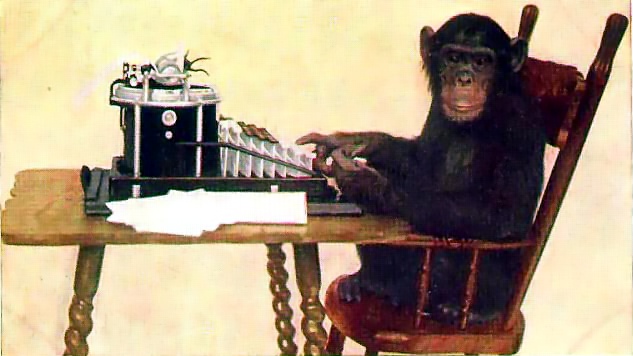According to Dr. Stephen Meyer says that "...neo-Darwanism will not survive the biology of the information age..."
He also asks, "Where did the information in DNA come from?" Yeah, why don't we ask that question when we're teaching the youth of our nation? Oh yeah, because we like to pretend that those questions don't exist AND because people can't seem to talk about such topics without getting upset, angry, sad, elitist, or religiously intolerant. Too bad, because the avoidance of such issues may be the downfall of our nation.
From this point on, most of the info I am pasting in comes from Wikipedia (to keep things as objective as possible). Although I did find ideacenter.org, a pro-ID site. This is not intended to be a thoughtful, full developed post (do I ever do that?!) but simply a spring board or catalyst to get people, including myself, to do more reading and study on biology and how it relates to our understanding of existence and of God.
------------------------------------------------
Irreducible complexity
(IC) is an argument made by proponents of intelligent design that certain biological systems are too complex to have evolved from simpler, or "less complete" predecessors, through natural selection acting upon a series of advantageous naturally occurring chance mutations. It is one of two main arguments intended to support intelligent design, the other being specified complexity.[1] It is dismissed by the scientific community[2] and intelligent design has been referred to as pseudoscience.[3]
Biochemistry professor Michael Behe, the originator of the argument of irreducible complexity, defines an irreducibly complex system as one "composed of several well-matched, interacting parts that contribute to the basic function, wherein the removal of any one of the parts causes the system to effectively cease functioning".[4] These examples are said to demonstrate that modern biological forms could not have evolved naturally. Critics consider that most, or all, of the examples were based on misunderstandings of the workings of the biological systems in question, and consider the low quality of these examples excellent evidence for the argument from ignorance.
Definitions
The term "irreducible complexity" was originally defined by Behe as:
A single system which is composed of several interacting parts that contribute to the basic function, and where the removal of any one of the parts causes the system to effectively cease functioning. (Darwin's Black Box p39 in the 2006 edition)
Supporters of intelligent design use this term to refer to biological systems and organs that they believe could not have come about by any series of small changes. They argue that anything less than the complete form of such a system or organ would not work at all, or would in fact be a detriment to the organism, and would therefore never survive the process of natural selection. Although they accept that some complex systems and organs can be explained by evolution, they claim that organs and biological features which are irreducibly complex cannot be explained by current models, and that an intelligent designer must have created life or guided its evolution. Accordingly, the debate on irreducible complexity concerns two questions: whether irreducible complexity can be found in nature, and what significance it would have if it did exist in nature.
A second definition given by Behe (his "evolutionary definition") is as follows:
An irreducibly complex evolutionary pathway is one that contains one or more unselected steps (that is, one or more necessary-but-unselected mutations). The degree of irreducible complexity is the number of unselected steps in the pathway.
Intelligent design advocate William Dembski gives this definition:
-----------------------------------------------------------------------------------A system performing a given basic function is irreducibly complex if it includes a set of well-matched, mutually interacting, nonarbitrarily individuated parts such that each part in the set is indispensable to maintaining the system's basic, and therefore original, function. The set of these indispensable parts is known as the irreducible core of the system. (No Free Lunch, 285)
Biological Machines Are God's Inventions (tabernacles of clay):

FAQ: Aren't "biological machines" too different from human-made machines to be considered examples of designed machines?
| The Short Answer: No, biological machines provide a good analogy to human designed machines for us to consider both designed. Both do work, and both are often build upon similar designs. |
The Long Answer:
From physics, the definition of work is W=F*d (F=force, d=distance). Based on this understanding, the bacterial flagellum as well as cilia perform work: they exert a force and thereby provide mobility. In the literal sense of the word, these are machines: they exert a force over a distance, which is work. Additionally, these machines have many specialized parts that are will integrated with each other, all of which are required to perform the function of mobility (this gets at the idea of IC). This is very much in line with the concept of a machine. Therefore, we suggest that these are true examples of machines in biology and not just mere collections of molecules. These function exactly as man-made machines.
The similarity between cellular machines and human machines is well-reflected in this quote from Bruce Alberts, president of the National Academy of Sciences:
(Bruce Alberts, "The Cell as a Collection of Protein Machines: Preparing the Next Generation of Molecular Biologists," Cell, 92(February 8, 1998): 291)
The intricacy of the bacterial flagellum dispels any notions that they are not like carefully designed machines:
(Susan Dutcher, "Flagellar assembly in two hundred and fifty easy-to-follow steps" Trends in Genetics, Volume 11, Issue 10)


